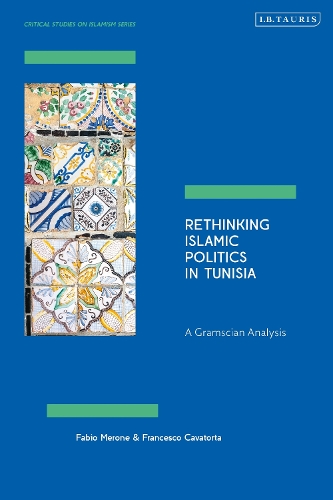
Rethinking Islamic Politics in Tunisia: A Gramscian Analysis
(Hardback)
Publishing Details
Rethinking Islamic Politics in Tunisia: A Gramscian Analysis
By (Author) Dr Fabio Merone
By (author) Francesco Cavatorta
Bloomsbury Publishing PLC
I.B. Tauris
27th November 2025
United Kingdom
Classifications
Professional and Scholarly
Non Fiction
Religion and politics
Politics and government
Physical Properties
Hardback
208
Width 156mm, Height 234mm
Description
The emergence of Islamist and Salafi movements the actors of Islamist Politics has been a critical area of scholarship on the Middle East and North Africa. But there is no theoretical framework to understand political Islam as a phenomenon that includes both Islamic ideology and modern activism. This book uses the Gramscian concept of political activism to provide this much-needed perspective. As Arab societies have had a similar historical development and trajectory to the society Gramsci was analyzing, his ideas are shown to be particularly relevant for understanding the post-2011 democratization and politicization of Islamist and Salafi movements.
Based on the case study of the Tunisian Islamist movement, al-Nahda, and the Tunisian Salafi movement, Ansar al-Sharia, political Islam is given a useful explanatory framework to explain how the ideological/theological side of Islamic activism realizes itself into practical political action. The book establishes the term Islamic politics to describe this combination of socio-religious mobilization - commonly defined as dawa - and political organization, including party or revolutionary organizations. Furthermore, the authors show that Islamists and Salafists can be described as post-Islamist in the same way communist parties became post-communist and post-ideological.
Written by two renowned experts on political Islam, the innovative theoretical framework used here can explain the development and behaviour of Islamist groups in other contexts, moving scholarship beyond traditional approaches.
Author Bio
Fabio Merone is Research Fellow at University of Rome 3 and Associate Fellow at the Interdisciplinary Research Centre on Africa and the Middle East at Laval University, Canada. He holds a PhD from Ghent University, Belgium.
Francesco Cavatorta is Professor of Political Science at the Department of Political Science, Laval University, Canada. He has worked on the politics of the Arab world for over twenty years. He holds a PhD from Trinity College Dublin, Ireland.
